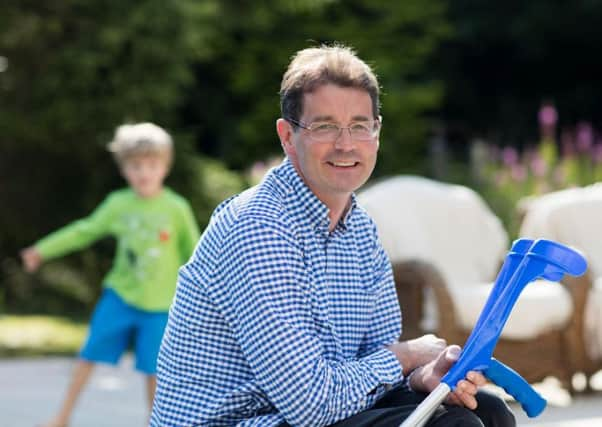Time to end multiple sclerosis stigmas


Mark Webb, 47, of Dunstable, has joined forces with the charity MS Society, as they release new findings exposing the stigma that people with the condition often face.
According to the survey almost half (45 per cent) of people diagnosed with MS feel they have experienced mistreatment because of their symptoms, while the most common experience is being accused of drunkenness because they are having trouble walking (49 per cent).
Advertisement
Hide AdAdvertisement
Hide AdDue to his condition, Mark uses mobility aids and suffered a traumatic experience six years ago in North Street’s parking spaces, shortly after his diagnosis.
Mark said: “I was walking back to the disabled parking area with my stick when five or six male teenagers on bikes surrounded my car.
“I locked myself in, while they swore at me and called me a ‘cripple’.
“I tried to rev the engine and drive backwards but they kept pretending to fall over, as if I’d hit them.
Advertisement
Hide AdAdvertisement
Hide Ad“I began to dial 999 and they rushed off. The whole thing lasted for ten minutes and they tried to make me feel less of a human being. I drove home and sobbed on my wife’s shoulder.”
Mark says the police were very sympathetic and tried all they could to find the teenagers, but because there was no CCTV in the parking area a follow-up could not be done.
Mark added: “I don’t think the absence of CCTV was an issue – what needs to be addressed instead is people’s attitudes towards those with disabilities.”
Over 100,000 people live in the UK with MS, yet 76 per cent of those believe that the public’s awareness of the disease is low or very low.
Advertisement
Hide AdAdvertisement
Hide AdThe condition attacks the nervous system and symptoms typically appear when people are in their 20s and 30s, including sight loss, disability and fatigue.
The condition is often described as unpredictable, as one day a person might be fine and then the next day they may lose their sight or be unable to move.
Mark said: “I hate it when people call us ‘MS sufferers’ - I try to be more than that.
“I’ve skydived three times to help raise awareness and am hoping to do it again next year.”
Advertisement
Hide AdAdvertisement
Hide AdThe adventurous man lives at home with his wife Joanne, 47, and their two sons Samuel, 10, and Toby, six. He works at Dixons Carphone PLC managing social media.
The survey also showed that family and friends can make a positive difference to those living with the condition, with 63 per cent receiving help from a partner, 40 per cent from immediate family and 34 per cent from friends – an important reminder to look out for others in the community and not to judge.
The MS Society is funding research to stop MS and working to find better treatments for everyone.
Their helpline can be telephoned for free on 0808 800 8000.